-cate
(This suffix has no etymological source; it is just a part of other words.)
The sisters, Patricia and Julia, often intercommunicate with each other by phone and e-mail.
2. To cause a person to become intensely excited or overjoyed to such a degree that he or she becomes irrational and uncontrollable: Winning $200,000 in the lottery intoxicated Mary so much that she couldn’t sleep that night!
3. To poison people: The deadly substance was detected before it was mixed with the orange juice which could have intoxicated just about everyone who was at the meeting.
4. Etymology: from Latin intoxicat-, from intoxicare, "to poison"; from Latin toxicum, ''poison".
2. Etymology: from Latin intricare, "to entangle, to perplex"; from in-, "in, into" + tricare, "to trick, to complicate, to perplex".
2. To situate or to assign a place to someone: The European firm wants to locate some of its employees to its sister company in San Francisco.
3. To be established in a particular place: Ted's bank is located in the center of town so all the residents can go there conveniently.
Sometimes a person needs to lubricate rusty bolts so they can be unscrewed.
Mechanics who work on cars usually need to lubricate certain engine parts in order to remove old ones and to attach new ones.
Different kinds of machines and engines, from jumbo jets to sewing machines, need to be lubricated in order for them to work properly.
Hyaluronic acid, a viscous slippery substance that lubricates the joints in the body, maintains the shape of the eyeballs, and is a key component of connective tissue, is inside the knees, elbows, fingers, etc. of people and it helps to lubricate and cushion the joints; in fact, hyaluronic acid is a lubricating substance found naturally in all of the joints of the body.
2. Etymology: from Latin lubricatum, "made slippery".People also manducate when they are satisfying their appetites during meals or snacks.
2. Etymology: from Latin manducare, "to chew".2. Etymology: from Latin masticare, from the Greek mastikhan, "to grind the teeth".
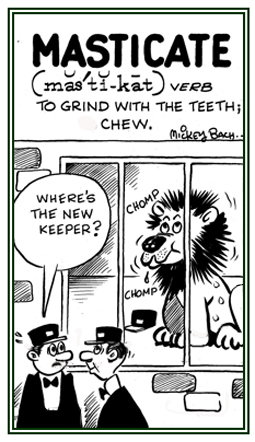
Go to this Word A Day Revisited Index
so you can see more of Mickey Bach's cartoons.
Doctor Nelson wants to medicate James, her patient, with a different prescription because he apparently has developed a strange allergy to the other drug.
2. To include healing substances for treatment of an unhealthy condition: One of the shampoos that Erla has was medicated with a therapeutic chemical to prevent dandruff from developing on her head.3. To chemically infuse a curative fluid with ingredients that improve one's bodily injuries: After falling on the ice and hurting herself badly, Lynn’s mother had to medicate her pains and bruises with a special ointment from the drug store.
Some spiders nidificate underground in order to protect their lodgings.
Some birds make a more or less extensive use of saliva as a cement in order to nidificate mud dwellings; such as, swallows, South American oven birds, and flamingos.
The use of salivary glands to nidificate their nesting places is done generally by swifts which glue small twigs to the inside of a chimney to form a tiny basket; or, as in the case of the Asiatic edible swifts, they just use saliva without twigs or anything else. Such places are harvested early in the nest-building season and used by some Chinese when they make "bird's nest soup".
2. Etymology: from Latin nidificare, "to make into a nest".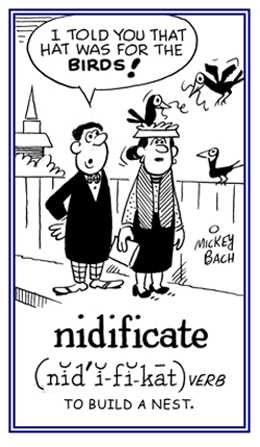
Go to this Word A Day Revisited Index
so you can see more of Mickey Bach's cartoons.
The phrase "for the birds" also means something that is "worthless", "useless", or "undesirable".
2. To darken, to make obscure, or to make something more difficult to understand: Bill tried to obfuscate his drunken driving with extraneous information about taking medication; however, the odor of alcohol on his breath was not obfuscating his real condition.
Politicians tend to keep obfuscating issues in an attempt to satisfy the various viewpoints of their political parties.
3. Etymology: from Latin obfuscatus and obfuscare, "to darken," from ob, "over" + fuscare, "to make dark"; from fuscus, "dark".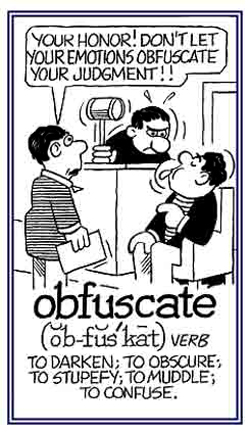
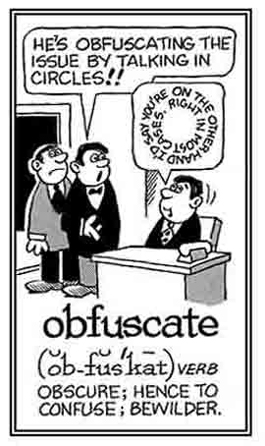
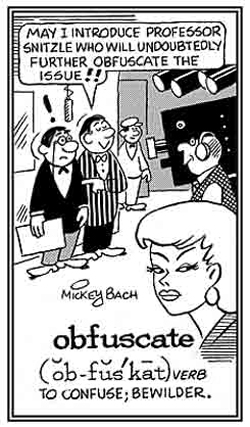
Go to this Word A Day Revisited Index
so you can see more Mickey Bach illustrations.
2. To calm down and to make less angry; especially, by appeasement; to conciliate; to pacify: The administrators placated the customers by agreeing to consider a reduction in prices for the items when they became available again.
The clerk was placating the angry customer with an apology and a new replacement for the damaged item that was returned.
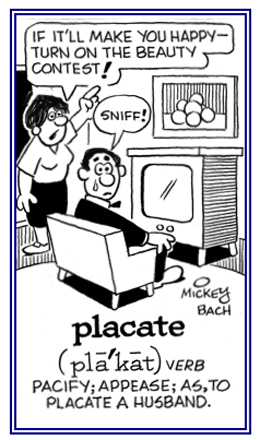
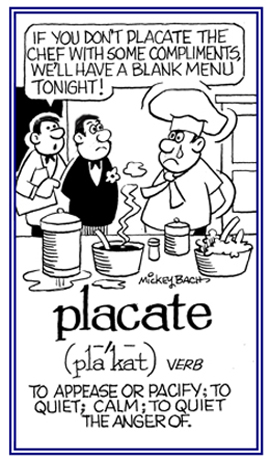
Go to this Word A Day Revisited Index
so you can see more of Mickey Bach's cartoons.
Jane's daughter, who was fifteen, pontificated with her friends in her high school about the best way to raise children.
2. Etymology: from Latin pontificare, "to speak or to behave as if the person knows everything" from pons, "bridge" + facere "to make."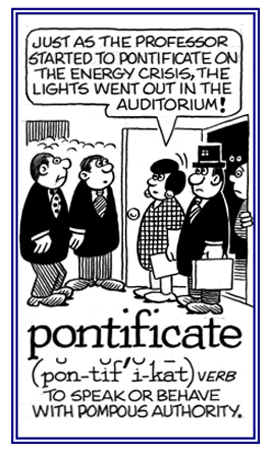
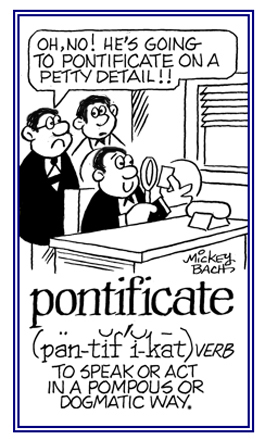
Go to this Word A Day Revisited Index
so you can see more of Mickey Bach's cartoons.
2. Etymology: from Latin, praedicatum, "something declared" and praedicatus,"declared, proclaimed"; from the verb praedicare; from prae, "beforehand" + dicare, "to make known".


